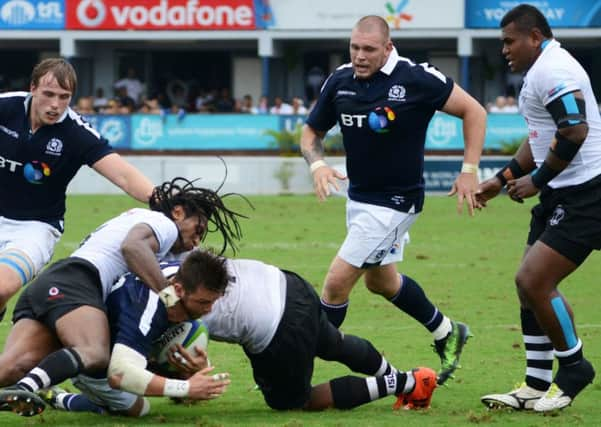Allan Massie: Scotland's defeat in Fiji was no disgrace


That’s enough of the Lions for the moment.
It was a pity, but not surprising , that Scotland lost to Fiji last week, and it has been pointed out that this was Fiji’s first win against a “Top-Tier” nation in a decade. What has been less remarked on is that Scotland alone among the old Five Nations and the Southern Hemisphere Big Three have deigned to play a Test match in Fiji in that time, doing so previously five years ago and winning that one 37-25. So every other Test Fiji have played against a Top-Tier Nation has been an away game.
Fiji produce wonderful rugby players, but have suffered shameful treatment. Their close neighbours New Zealand have never played a full Test in Fiji. South Africa have never been there at all, France not for 19 years, Wales and Australia not for 23 (which takes us back to just before the dawn of the professional game). England haven’t been there for 26 years. One thinks of Ireland as one of the good guys of the game, but the Irish Rugby Union haven’t ventured to play a Test in Fiji for 41 years, which takes us still further back to the days of Willie John McBride and Mike Gibson. Fiji’s record in international matches would surely be better if they weren’t almost always playing away from home.
Advertisement
Hide AdAdvertisement
Hide AdIn sport there are many dubious statistics, open to a variety of interpretation, but one thing is constant and undeniable: in team sports like rugby, football and cricket, home advantage counts. You almost always have a better chance of winning at home than away. Over the years England have generally been stronger than Scotland. We all know – and are reminded every second year – that we haven’t won at Twickenham since 1983. On the other hand, of the 17 Calcutta Cup matches played at Murrayfeld since then, we have won six and drawn one. Not a great record, admittedly, but a darned sight better than at Twickenham where, indeed, we have won only four times since the ground opened more than 100 years ago.
Likewise, against the other members of the old Five Nations, we have always found it more difficult to win in Cardiff, Dublin and Paris than at Murrayfield and vice versa. Nobody, one should add, finds it easy to win at Twickenham but even very good England teams often come a cropper in Paris, Dublin and Cardiff. This year, England’s hope of a Grand Slam disappeared in the tournament’s last match in Dublin, just as they did four years ago in Cardiff. For many of their supporters, if not, one assumes, the players, there was more than hope on these occasions, there was expectation, just as there had been when they came to Murrayfield in search of a Grand Slam in 1990 and 2000.
The hope was reasonable, the expectation foolish because it neglected to take the difficulty of winning away into account. This, after all, is one reason why the Lions, no matter how star-studded, have won so few series in New Zealand and South Africa. They may take a huge support with them these days, but the odds are against them simply because they are occupying the away dressing room.
Bearing this in mind, Scotland’s defeat in Fiji was less remarkable, and should have been less surprising, than their victory the previous week in Australia where they overturned the Wallabies’ home advantage. It’s a thought which may also dull expectation for the next Six Nations, it being a year when we have three away matches and only two at home. Nevertheless, the fact that we now have a good team, perhaps a very good one, gives us, when coupled with home advantage, at least an even chance of beating France and England.
New Zealand in November is another matter, the All Blacks’ overall superiority being likely to negate home advantage. Even so, one might remember that we have twice escaped defeat and managed to draw with New Zealand, on both occasions at Murrayfield – of course.
Nobody knows just why home advantage matters so much, but that it does matter is undeniable.